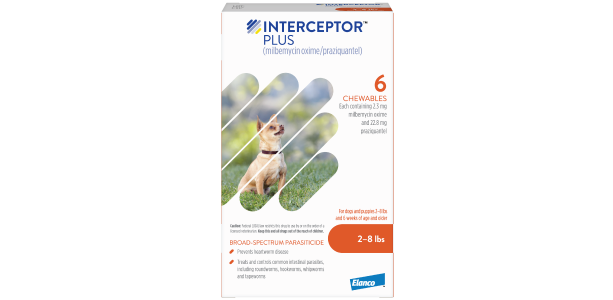Questions and answers about whipworms in dogs.
Whipworms can cause health issues in your dog. These problem-causing parasites are quite common, affecting dogs throughout the United States. Prevention and proper treatment is key to protecting your pup.
What Are Whipworms in Dogs?
Whipworms are intestinal parasites that live inside the large intestine and a part of the digestive system called the cecum, a pouch that connects the small and large intestine. A whipworm’s life cycle has three stages:
- Egg
- Larvae
- Adult
Let’s say your dog eats something off the ground and accidentally ingests some whipworm eggs (they’re microscopic, so it’s easy to do!). The eggs hatch and mature to larvae inside your dog’s intestinal track. In about 11 weeks the whipworm larvae become mature adults, and are now able to produce eggs. These eggs can end up in your dog’s poop, which starts the life cycle all over again.
Can You Show Me Pictures of Whipworms in Dog Poop?
We can, but spotting whipworms in your dog’s poop isn’t likely. Whipworms are small, thin and threadlike. They can appear almost translucent, with one end slightly larger than the other, giving them a whip-like shape. If your dog has had a whipworm infection for a long time, there’s a chance many mature worms may pass with each stool, making them easier to spot. A larger number of whipworms means an increased chance of symptoms—chances are, you’ll spot signs of a whipworm infection before ever seeing them. Whipworms’ microscopic eggs are not always shed consistently and cannot be seen by the naked eye.

How Do Dogs Get Whipworms?
Dogs may ingest whipworm eggs by directly eating grass, dirt or pet stools, or spending time in a contaminated environment, such as a dog park or even your own backyard. One of a whipworm’s super powers is its resiliency. Whipworm eggs can remain viable – even in cases of extreme heat and dryness – for many years!
What Are the Symptoms of Whipworms in Dogs?
Not all pets show symptoms of whipworms. In fact, some dogs can be infected and appear perfectly normal. Whipworms can cause irritation leading to:
- Dehydration
- Diarrhea
- Bloody stools
- Weight loss
- Recurring weakness
Can Whipworms Kill a Dog?
In severe cases where there’s a high number of whipworms present and there’s no treatment, whipworms can be fatal. Whipworms can more dangerous for puppies, older dogs or sick dogs. If your dog is showing any symptoms that might indicate whipworms, it’s important to contact your vet. Detection may require several stool samples and treatment may take several months.
Can Humans Get Whipworms from Dogs?
Whipworms in dogs are not considered zoonotic, but this doesn’t mean people are completely immune to whipworms in general. We have our own species of whipworms, spread through feces. Still, it’s always wise to use a bag, wear gloves and wash your hands when picking up dog poop.
How Are Whipworms Diagnosed?
If you suspect whipworms, talk to your vet. Whipworm eggs can sometimes be detected on a dog’s stool sample using a microscope, but because eggs are shed intermittently, multiple stool samples may be required. Your vet may also suggest a parasite antigen test or, in more severe cases, imaging such as an ultrasound.
Whipworm Treatments in Dogs: What Can Help Fight Infections?
The good news is that whipworm infections can be treated with a dewormer. These products kill whipworms in your dog, which then pass through their stool. Preventing reinfection requires vigilance. Setting up a regular deworming schedule can help protect your pet. You can find effective dewormers at pet specialty stores and veterinarian offices.
How Can You Prevent Whipworms in Dogs?
You can help prevent whipworms by keeping pet areas clean and regularly removing pet waste from your yard. Also be mindful of the fact that you can inadvertently introduce whipworm eggs inside your home if you step in soil contaminated with whipworm eggs and then wear your shoes inside your home. Prevention is easier than detection and treatment. Incorporating a monthly chew that treats and controls whipworms and other parasites can bring you peace of mind.

Interceptor® Plus (milbemycin oxime/praziquantel)
A monthly chew that protects dogs and puppies 6 weeks or older and 2 pounds or greater against heartworm disease, adult hookworm, roundworm, tapeworm and whipworm infections.
Interceptor® Plus (milbemycin oxime/praziquantel)
Indications:
Interceptor Plus prevents heartworm disease and treats and controls adult roundworm, hookworm, whipworm, and tapeworm infections in dogs and puppies 6 weeks or older and 2 pounds or greater.
Important Safety Information:
Treatment with fewer than 6 monthly doses after the last exposure to mosquitoes may not provide complete heartworm prevention. Prior to administration of Interceptor Plus, dogs should be tested for existing heartworm infections. The safety of Interceptor Plus has not been evaluated in dogs used for breeding or in lactating females. The following adverse reactions have been reported in dogs after administration of milbemycin oxime or praziquantel: vomiting, diarrhea, decreased activity, incoordination, anorexia, convulsions, weakness, and salivation.
For complete safety information, please see Interceptor Plus product label or ask your veterinarian.
Trifexis® (spinosad + milbemycin oxime)
Indications:
Trifexis prevents heartworm disease. Trifexis kills fleas and prevents flea infestations, and treats and controls adult hookworm, roundworm and whipworm infections in dogs and puppies 8 weeks and older and 5 pounds or more.
Important Safety Information:
The use of ivermectin at higher than FDA-approved doses at the same time as Trifexis can result in serious side effects. Treatment with fewer than three monthly doses after the last exposure to mosquitoes may not provide complete heartworm prevention. Prior to administration of Trifexis, dogs should be tested for existing heartworm infection. Use with caution in breeding females. The safe use of Trifexis in breeding males has not been evaluated. Use with caution in dogs with pre-existing epilepsy. The most common adverse reactions reported are vomiting, decreased activity, itching, decreased appetite, and diarrhea. To ensure heartworm prevention, observe your dog for one hour after administration. If vomiting occurs within an hour of administration, redose with another full dose. Puppies less than 14 weeks of age may experience a higher rate of vomiting.
For complete safety information, please see Trifexis product label or ask your veterinarian.
Quad Dewormer (praziquantel/pyrantel pamoate/febantel) Chewable Tablets for Dogs
USES:
Quad Dewormer (praziquantel/pyrantel pamoate/febantel) Chewable Tablets for Dogs will remove common tapeworms (Dipylidium caninum and Taenia pisiformis), remove common hookworms (Ancylostoma caninum, Uncinaria stenocephala), remove common roundworms (Toxocara canis and Toxascaris leonina) and remove whipworms in dogs (Trichuris vulpis).
Important Safety Information:
Consult your veterinarian for assistance in the diagnosis, treatment and control of parasitism. Consult your veterinarian before administering the tablets to weak or debilitated animals. Do not deworm a dog or puppy that is sick. Consult your veterinarian for diagnosis of the illness and appropriate care. Not for use in puppies that are younger than 3 weeks of age or dogs weighing less than 2 lbs. May be given directly in the mouth or offered in a small amount of food. WARNING: Keep out of reach of children.
For complete directions for use and safety information see product label.
Interceptor® Plus
CAUTIONS: Keep out of reach of children. For animal use only.





